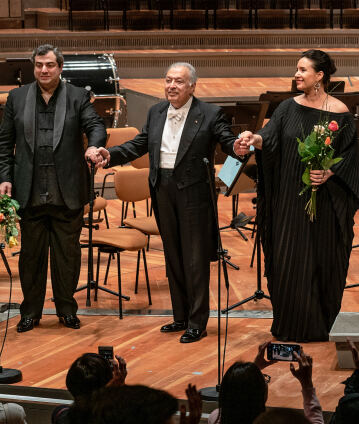Zubin Mehta dirige «Otello»

A sus 75 años, Giuseppe Verdi volvió a alcanzar un nuevo nivel artístico con Otello. Ninguna de sus otras óperas posee semejante contundencia o energía dramática, hasta la escena final misma del asesinato. Tras las representaciones en el Festival de Pascua de Baden-Baden, los Berliner Philharmoniker presentan ahora al público de Berlín su versión de esta partitura sombríamente expresiva junto con un grupo de destacados cantantes y el director Zubin Mehta.
Giuseppe Verdi’s Shakespeare opera Otello, premiered at La Scala in Milan in 1887, starts with an unparalleled musical bang: when the curtain rises, a storm depicted by the most sophisticated instrumental and vocal means rages off the coast of Cyprus – and already hints at the deadly passions that are ignited in the course of the drama. Sixteen years had passed since the premiere of Aida, which was composed for the opening of the Suez Canal, when Verdi once again returned to composing operas with Otello. Devastating criticism had meant that Verdi – apart from revisions of Simon Boccanegra and Don Carlos – no longer wanted to compose other stage works. “I would just hear again that I was not able to write and was a follower of Wagner,” the composer explained in a letter in 1878: “A fine result! After almost 40 years of musicianship, to end up as an imitator.” Only after the publisher Giulio Ricordi proposed a collaboration with the writer and composer Arrigo Boito did Verdi consider a new opera project. Seven years of intensive work together was to pass between Boito’s first sketch for Otello and Verdi’s completion of the compositional work.
Verdi ultimately decided against the original idea of naming their joint work “Iago” after the sinister villain of Shakespeare’s play: “He is (it is true) the demon who moves everything,” argued the composer, “but Otello is the one who acts. He loves, is jealous, kills and kills himself.” It is undoubtedly also thanks to his librettist that Verdi was able to open a new chapter in the history of Italian opera with Otello, for Boito, with a text that broke away from the traditions of Italian librettistics of that time, first created the possibilities for Verdi’s musically innovative setting of the Shakespearean jealousy drama.
A few days after staged performances at the Easter Festival in Baden-Baden, the Berliner Philharmoniker, conducted by Zubin Mehta, present two concert performances of Verdi’s late work at the Philharmonie with the conductor and a top-class ensemble of singers. The choral role, which ranges from the stormy beginning of the opera to lyrical passages, is taken by the Rundfunkchor Berlin, an established musical partner of the Berliner Philharmoniker.
© 2019 Berlin Phil Media GmbH
Entrevistas del concierto
Categoría
Artistas
Nuestras recomendaciones
- Simon Rattle dirige fragmentos de «Ocaso de los dioses» de Wagner
- Kirill Petrenko con «Francesca da Rimini» de Rajmáninov
- Kirill Petrenko dirige «Elektra» de Strauss en el Festival de Pascua en Baden-Baden
- Le Grand Macabre de Ligeti con Simon Rattle y Peter Sellars
- Simon Rattle dirige «La flauta mágica» de Mozart
- Kirill Petrenko dirige «Electra» de Strauss